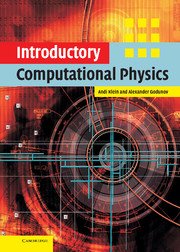Book contents
- Frontmatter
- Contents
- Preface
- 1 Introduction
- 2 Basics
- 3 Short introduction to Linux
- 4 Interpolation
- 5 Taking derivatives
- 6 Numerical integration
- 7 Solution of nonlinear equations
- 8 Differential equations
- 9 Matrices
- 10 Random processes and Monte Carlo simulation
- References
- Appendix A The ROOT system
- Appendix B Free scientific libraries
- Appendix C FORTRAN and C++
- Appendix D Program listings
- Index
Preface
Published online by Cambridge University Press: 04 August 2010
- Frontmatter
- Contents
- Preface
- 1 Introduction
- 2 Basics
- 3 Short introduction to Linux
- 4 Interpolation
- 5 Taking derivatives
- 6 Numerical integration
- 7 Solution of nonlinear equations
- 8 Differential equations
- 9 Matrices
- 10 Random processes and Monte Carlo simulation
- References
- Appendix A The ROOT system
- Appendix B Free scientific libraries
- Appendix C FORTRAN and C++
- Appendix D Program listings
- Index
Summary
Computers are one of the most important tools in any field of science and especially in physics. A student in an undergraduate lab will appreciate the help of a computer in calculating a result from a series of measurements. The more advanced researcher will use them for tasks like simulating an experiment, or solving complex systems of equations. Physics is deeply connected to mathematics and requires a lot of calculational skills. If one is only interested in a conceptual understanding of the field, or an estimate of the outcome of an experiment, simple calculus will probably suffice. We can solve the problem of a cannon ball without air resistance or Coriolis force with very elementary math, but once we include these effects, the solution becomes quite a bit more complicated. Physics, being an experimental science, also requires that the measured results are statistically significant, meaning we have to repeat an experiment several times, necessitating the same calculation over and over again and comparing the results. This then leads to the question of how to present your results. It is much easier to determine the compatibility of data points from a graph, rather than to try to compare say 1000 numbers with each other and determine whether there is a significant deviation. From this it is clear that the computer should not only “crunch numbers,” but should also be able to display the results graphically.
- Type
- Chapter
- Information
- Introductory Computational Physics , pp. ix - xPublisher: Cambridge University PressPrint publication year: 2006



